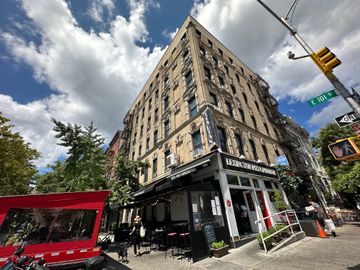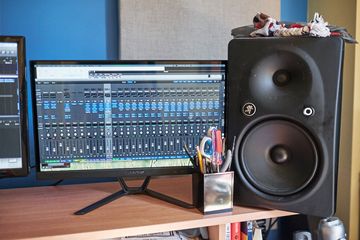E 101st Street’s Lexington Pizza Parlour may sound like your typical New York slice shop, but all it takes is one meal at the family-run, intimate Italian bistro to see that the popular neighborhood eatery is anything but. Operated by local restaurateur Charles Devigne, the Lexington Pizza Parlour offers a wide variety of traditional Italian fare — from their signature Roman Artichokes to a six-layer Lasagna, Veal Saltimbocca to freshly made desserts from their in-house Harlem Baking Company — and of course, a comprehensive selection of hand-crafted, brick oven pizzas. “My wife can’t stand the name, ” Charles laughed, referencing the leftover moniker from its previous owners. While the “pizza parlour” denomination may belie the cafe’s full assortment of fine dining entrees, it’s a callback to 2015, when Charles first walked by the space on the way to drop his son off at school and noticed a previously undiscovered slice shop. “I came to this restaurant with my son for a slice of pizza, and I was really shocked to see the menu — the previous owners were Italian guys who had been in the restaurant business in Queens importing Italian products, ” he told us. “We started chatting and it was at that point that he told me he was looking to sell the place. We bought it from them, and I kept the name as it was. ” Building a restaurant from the ground up, Lexington Pizza Parlour quickly garnered attention — and some confusion — from New York diners, said Charles. “I really started to think about changing the name in 2019 — I was even sending out surveys for people to make a list of names, because it just was killing us, ” he added. But when the COVID-19 pandemic hit and overwhelmed the city’s hospitals, they shifted focus to support healthcare workers in need. Raising over $50, 000 for New York hospitals and delivering more than 18, 000 meals to field hospitals and overfull emergency wings alike, “we started getting a lot of press as Lexington Pizza Parlour, ” said Charles, who spent the early days of COVID-19 personally delivering pies citywide. “It was a really great thing to be a part of, and now it’s almost that we can’t change the name, ” he told Manhattan Sideways. “I’ve decided that we’re sort of a ‘culinary speakeasy’ — you have to come find us because somebody recommended it to you. ” Those who do find Lexington Pizza Parlour, however, keep coming back. “Our clientele is very loyal, ” said Charles. “Once they find us, get to know the space and my staff and enjoy the food, they become very special, loyal customers. One thing I know is that ‘Mom and Pop’ businesses are dying, unfortunately, and while we’re never going to get wealthy doing this, we have a great product and I’d rather make two slow nickels than a fast dime. ” He added, “It’s really become a family tree — there are different seeds of people, from the first customer base of a dozen people to everyone who they’ve brought since. I’ve come to make peace with the name Lexington Pizza Parlour! ”

